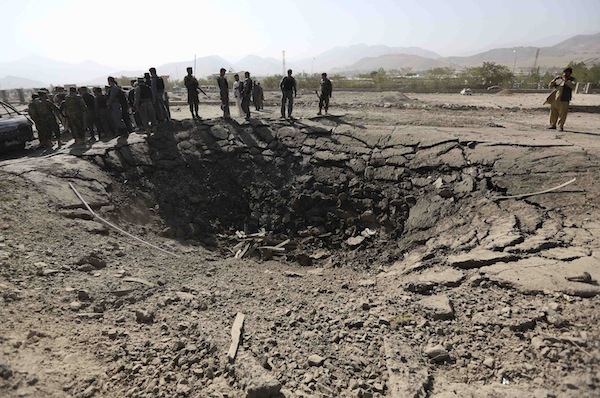KANDAHAR, June 6 ― At this sprawling US military base in the middle of the Afghan desert, sometimes it's difficult to tell if there's a war going on.
Along a wooden boardwalk at the Kandahar Airfield, you can order a raspberry smoothie, buy pirated DVDs, eat a pizza, shop for trinkets and watch people in shorts play volleyball on a sand court.
As NATO's US-led force prepares to depart by December, more and more troops are “behind the wire” on heavily guarded bases, with Afghan forces now taking charge of the fight against Taliban insurgents.
The deadly conflict of homemade bombs and militant ambushes seems far away at the larger bases in Afghanistan, where television screens blast US cable news and basketball games.
The contradiction bothers Staff Sergeant Sean Clayborn, 32, from the US Army's 101st Airborne Division.
His unit has a dangerous job clearing routes of explosives, and all the creature comforts can give a false sense of safety for the soldiers when they return to Bagram Airfield north of Kabul, he said.
“Bagram is very misleading. It gives you the impression you're not really where you are,” said Clayborn, who deployed in February.
“You see civilians. You can shop. It's all a distraction.”
At smaller, more remote outposts, he said, a unit becomes a “tighter knit” team.
He has little enthusiasm for activities meant to occupy the troops, including karaoke, salsa dancing and movie nights. “Again it's the illusion that you're not where you are,” he said.
Other soldiers, including those who spend time outside the big bases, disagreed.
“I like it,” said US Navy Petty Officer Alexis Palm, 22, as she sipped on a caramel frappe.
She works as a welder at a smaller base down the road, and she said a visit to the boardwalk is a morale booster. “I think it helps us decompress.”
Espresso shots and speed limits
Rocket attacks used to be a daily occurrence at Kandahar Airfield, or “KAF”, but now months have passed since the last assault.
Even if there is little physical danger, the schedule at KAF can be gruelling and monotonous. Most work seven days a week, 12 hours a day. Their spare time is spent at the gym, watching films or talking to family in online video chats.
Alcohol is strictly forbidden, but to help troops keep up the pace, the Green Bean coffee shop offers extra doses of caffeine.
With the motto “Honor First, Coffee Second”, the menu features mocha frappes, cappuccinos and a “MOAC” (Mother Of All Coffee) ― four shots of espresso added to a giant cup.
Home to thousands of soldiers and civilians and round-the-clock military flights, Kandahar and Bagram resemble mini-cities, with strict rules that seem out of place in a war zone.
While soldiers must carry their assault rifles around the base, the speed limit is a modest 25 kilometres (16 miles) an hour and seatbelts must be worn at all times.
If caught speeding, a soldier or a civilian contractor can expect a session with the provost marshal, who will inform the appropriate senior officer or supervisor.
The troops behind the wire are largely cut off from Afghanistan. Just about their only contact with the local population are the Afghan workers who file in every day past guards to serve food or sell their wares at bazaars set up for the troops.
The air-conditioned, well-stocked bases, with electricity, plumbing and 24-hour lighting, offer a stark contrast to the impoverished world of Afghans outside the gates.
Next to the Kandahar base is a school for Afghan children, where crowds of kids file in every day to a dilapidated building with no heating in the winter and no fans in the summer.
General Stanley McChrystal, the former NATO commander in Afghanistan who oversaw a troop “surge” in 2010, disapproved of the Kandahar boardwalk and other such amenities, favouring a more austere setting for troops to focus on the life-and-death mission at hand.
McChrystal wanted all the fast food joints closed down, but it turned out as a US officer, he only had authority over restaurants that were contracted by the American government. So he could only close down a few of them, including Burger King.
When he was forced to step down over a magazine interview, the fast food outlets soon re-opened.
Now some of the shops and eateries are closing again ― but this time it's because of the imminent departure of most of the NATO force by a year-end deadline.
At Bagram, the fried-chicken outlet Popeye's shut down on June 1. And at Kandahar, a pizzeria and a French cafe that sold baguette sandwiches have been torn down.
This week a dump truck carted away the remnants of the TGI Friday's restaurant.
“When they close TGI Friday's,” one NATO officer said, “you know the war's over.” ― AFP






















